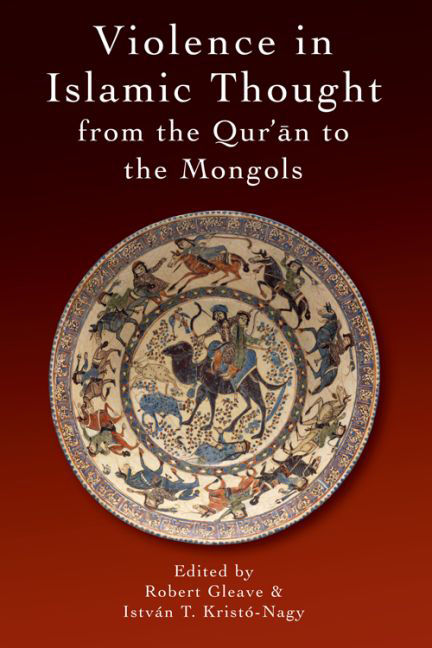Book contents
- Frontmatter
- Contents
- Dates and Abbreviations
- List of Figures and Tables
- 1 INTRODUCTION
- PART I JIHĀD AND CONQUEST: ATTITUDES TO VIOLENCE AGAINST THE EXTERNAL ENEMIES OF THE MUSLIM COMMUNITY
- PART II THE CHALLENGED ESTABLISHMENT: ATTITUDES TO VIOLENCE AGAINST THE STATE AND IN ITS DEFENCE WITHIN THE MUSLIM COMMUNITY
- PART III LUST AND FLESH: ATTITUDES TO VIOLENCE AGAINST THE DEFENCELESS, INTRA-COMMUNITARIAN VIOLENCE BY NON-STATE ACTORS
- 10 VIOLENCE AGAINST WOMEN IN ANDALUSI HISTORICAL SOURCES (THIRD/NINTH–SEVENTH/THIRTEENTH CENTURIES)
- 11 SEXUAL VIOLENCE IN VERSE: THE CASE OF JITHIN, AL-FARAZDAQ'S SISTER
- 12 BANDITS
- 13 EATING PEOPLE IS WRONG: SOME EYEWITNESS ACCOUNTS OF CANNIBALISM IN ARABIC SOURCES
- 14 ANIMALS WOULD FOLLOW SHĀFIISM: LEGITIMATE AND ILLEGITIMATE VIOLENCE TO ANIMALS IN MEDIEVAL ISLAMIC THOUGHT
- Bibliography
- Index of Qurānic Citations
- General Index
13 - EATING PEOPLE IS WRONG: SOME EYEWITNESS ACCOUNTS OF CANNIBALISM IN ARABIC SOURCES
from PART III - LUST AND FLESH: ATTITUDES TO VIOLENCE AGAINST THE DEFENCELESS, INTRA-COMMUNITARIAN VIOLENCE BY NON-STATE ACTORS
Published online by Cambridge University Press: 15 September 2017
- Frontmatter
- Contents
- Dates and Abbreviations
- List of Figures and Tables
- 1 INTRODUCTION
- PART I JIHĀD AND CONQUEST: ATTITUDES TO VIOLENCE AGAINST THE EXTERNAL ENEMIES OF THE MUSLIM COMMUNITY
- PART II THE CHALLENGED ESTABLISHMENT: ATTITUDES TO VIOLENCE AGAINST THE STATE AND IN ITS DEFENCE WITHIN THE MUSLIM COMMUNITY
- PART III LUST AND FLESH: ATTITUDES TO VIOLENCE AGAINST THE DEFENCELESS, INTRA-COMMUNITARIAN VIOLENCE BY NON-STATE ACTORS
- 10 VIOLENCE AGAINST WOMEN IN ANDALUSI HISTORICAL SOURCES (THIRD/NINTH–SEVENTH/THIRTEENTH CENTURIES)
- 11 SEXUAL VIOLENCE IN VERSE: THE CASE OF JITHIN, AL-FARAZDAQ'S SISTER
- 12 BANDITS
- 13 EATING PEOPLE IS WRONG: SOME EYEWITNESS ACCOUNTS OF CANNIBALISM IN ARABIC SOURCES
- 14 ANIMALS WOULD FOLLOW SHĀFIISM: LEGITIMATE AND ILLEGITIMATE VIOLENCE TO ANIMALS IN MEDIEVAL ISLAMIC THOUGHT
- Bibliography
- Index of Qurānic Citations
- General Index
Summary
There is something deeply disquieting about cannibalism. Motives and technicalities do not matter; eating human flesh is now universally considered revolting, whatever the circumstances. However, if we trust a long line of anthropologists and ethnographers, this has not always been the case in all parts of the world and is therefore not self-evident. Stripped of all cultural context and psychological connotations and in purely detached terms, the act of cannibalising a corpse might be considered a victimless crime, the victim of the act being a lifeless body destined to decay anyway. And yet, cannibalism is instinctively perceived in virtually all cultures today as grisly violence and, more than that, a violation of all that makes us human. It is probably this perception that led some scholars to question whether human beings could ever have engaged in such practices, except in the most wretched conditions.
William Arens’ controversial monograph The Man-Eating Myth has sometimes been understood as suggesting the rather extreme theory that cannibalism did not ever exist as an accepted custom in any society. Such a proposal is virtually impossible to prove – while one counter-example will instantly disprove it – but, in fact, the basic contention of the book appears to be something else – namely, that reports of cannibalism in faraway lands and among exotic peoples cannot be taken at face value, as they often serve ideological purposes and express deep-rooted stereotypes. The proposal that each and every report of a custom as instinctively repulsive to the vast majority of humans as cannibalism should be viewed with suspicion and analysed very carefully before accepting it seems to me eminently reasonable. Therefore, instead of joining the general debate on the existence or otherwise of customary cannibalism in primitive societies, the following paragraphs are concerned, first, with the reliability and implications of three medieval Arabic accounts of African anthropophagy, and secondly and on a more general plane, with medieval Muslim notions of savagery and civilisation and Muslim conceptions of the inviolability of the human body. The focal concern of this study owes a lot to the sensible proposition of William Arens: ‘The idea of “others” as cannibals, rather than the act, is the universal phenomenon. The significant question is not why people eat human flesh, but why one group invariably assumes that others do.’
- Type
- Chapter
- Information
- Violence in Islamic Thought from the Qur'an to the Mongols , pp. 200 - 224Publisher: Edinburgh University PressPrint publication year: 2015



